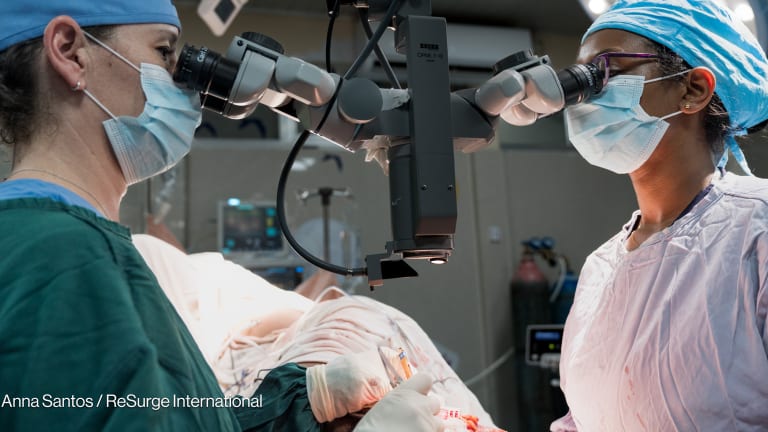
Cancer is projected to kill more than 16 million people by 2040, and low-income countries will bear the heaviest burden. We can reduce that toll by investing now in surgical care, instead of waiting for funding to expand access to radiation, chemotherapy, and new drugs.
Chemotherapy and radiotherapy are still necessary treatments, but often of limited value unless paired with surgery. They are expensive options and require major reforms to the existing health infrastructure, such as training and recruiting new radiation oncologists. India, for example, has barely 2,000 trained radiation oncologists for a population of over 1.3 billion people.
“We need to expand affordable options.”
—This is why surgery, a practice that has been used for cancer care for centuries, may provide a valuable and affordable alternative, until countries can pursue more comprehensive reforms that integrate all available options for clinical management of cancer, including newer developments such as immunotherapy. Global health leaders should be thinking about how to deliver more comprehensive, affordable care to even more people.
Low- and middle-income countries are home to 35 percent of the global population but account for only 3.5 percent of all surgical procedures. For cash-strapped finance ministries facing impossible health care choices, supporting surgical services would provide a 2 for 1 benefit: It can help both cancer patients and people needing urgent trauma care.
Surgical care, when integrated into essential services and primary care, is available to all patients and most cancers respond to surgical removal — especially if diagnosed early. Integrating surgical care into essential services will also aid in early diagnosis, as primary care is often the first point of contact with the health systems for most cancer patients.
Compared to radiotherapy or chemotherapy, surgery would serve the much deeper need for cancer care. For example, only 40-60 percent of cancer patients have access to radiotherapy and not all cancers can be effectively managed with radiotherapy alone.
In high-income countries, given the resources and infrastructure available, it is no surprise that cancer care focuses on how oncologists can develop new cancer drugs and use established drugs in new regimens.
Yet these expensive new options are unavailable to the vast majority of people living in low-income countries. Waiting for these new treatments will cost lives. In places where financial resources are limited, developing surgical care could save more lives at a lower cost.
When surgical care is scaled up, clinical benefits improve across specialties, strengthening entire health systems, not just cancer care. Surgical care is also indispensable to overall cancer management, even for those who will eventually benefit from radiotherapy or chemotherapy as an adjunct.
The cost of cancer care is a real concern. An analysis published in The Lancet estimated that the cost of scaling up radiotherapy would be $26.6 billion for low-income countries and $157.4 billion for middle-income countries. Although the analysis concluded that there would be a moderate return on investment, even the authors had to concede that these options are beneficial only when combined with surgical care, as radiotherapy is often used as an adjunct.
Surgical services, on the other hand, are already part of postgraduate medical training and cost a fraction of these figures. An analysis on scaling up surgical care reported that total costs boiled down to an annual $1.1 billion for low-income countries and an annual $8.4 billion for low- and middle-income countries — 4 percent of total annual health expenditure in both categories.
We can defeat cancer, but it will require wiser investment of limited resources. Governments must work together with health policy analysts and use the best evidence available to guide their decisions. The health care community can keep advocating for better access to new drugs and innovative cancer care in the global south. In the meantime, we need to expand affordable options such as surgery.








